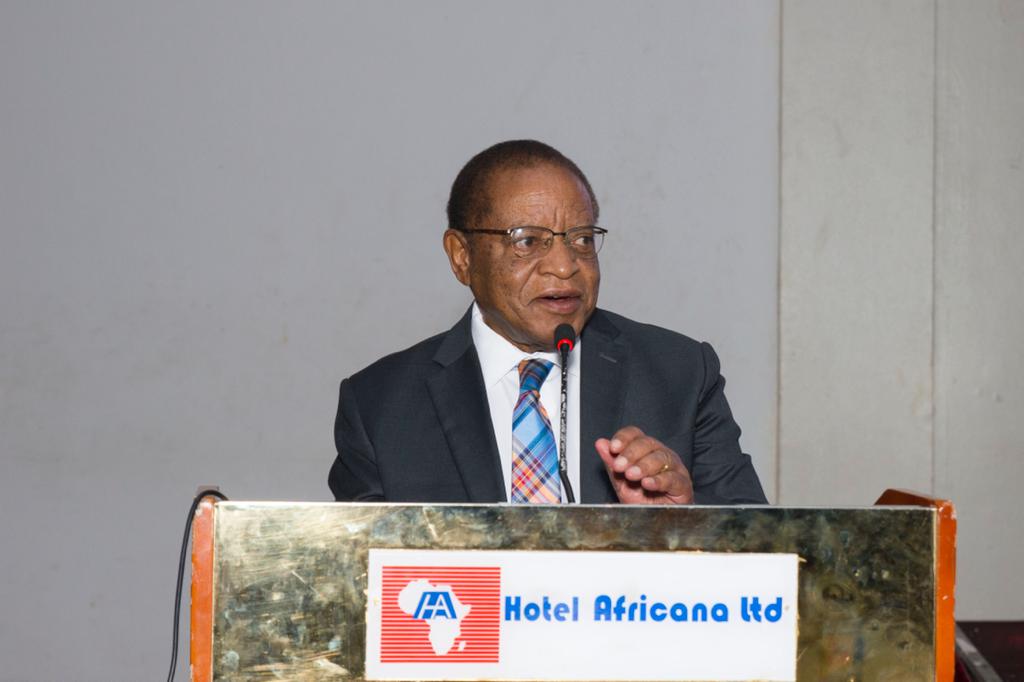Dr Suruma pushes radical social agenda for Uganda’s oil revenues

Managed prudently, proceeds from Uganda’s oil could be a lever to deliver better social protection for a majority of its citizens in a sustainable manner, says Makerere University Chancellor and senior presidential advisor on finance and planning, Dr Ezra Suruma.
This can be achieved first, through investing oil revenues in activities that accelerate job creation and secondly by including citizens in decisions about how oil wealth should be managed and used.
Delivering the keynote address to this year’s edition of the Uganda Parliamentary Forum on Social Protection’s National Social Dialogue October 31, Suruma observed that given the huge ranks of unemployed youth, applying oil revenues to employment creation, would provide a fast track to reducing vulnerability among people of working age. Another portion of oil proceeds could then be used to support that segment of the population who are too old to work, through a pension.
Suruma who also called for a referendum on oil revenues said investment in social protection plays a critical role in addressing poverty, inequality, and vulnerability, ran projections which suggested that at global price for crude at USD 90 for a barrel, Uganda’s daily earnings could gross USD 16 million.
The current model under which social protection is funded through contributary schemes, personal savings and insurance by those in formal employment, inevitably leaves a huge section out of the population out of the social protection loop. According to Suruma, the biggest challenge to social protection is unemployment and a government system that fails to attain employment for the majority of citizens needs to be replaced because it would have failed in its primary duty.
“The first challenge of social protection is income or employment. In any advanced economy, the number that matters most is the rate of employment to that of unemployment,” said.
Arguing that oil revenues present a unique opportunity for Uganda, Suruma said decisions on how they will be spent should be subjected to a national referendum on oil revenues “to ensure citizens participate in deciding priorities for its expenditure and all benefit from oil wealth.”
“Although idea may not be popular with bureaucrats who might want a monopoly over management of oil revenues, it is necessary. People can be asked if they would like to receive shares in a permanent fund that would grant them the right to gain directly from oil the earnings.
“We need a referendum that it is participatory, inclusive, people driven and bottom up to ensure oil wealth is allocated efficiently, non-corruptly and equitably,” Suruma argued, proposing that half of proceeds from oil could be placed at the disposal of the people through the Uganda Petroleum Fund to make oil a blessing for all Ugandans and achieve prosperity for all.
“Ugandans need social protection so that no citizen is homeless, left to starve to death or live without basic medical care or health insurance. A national oil fund would also secure the wealth for future generations in the manner that Norway has done it,” he emphasized.
2nd Deputy Premier and Minister for East African Cooperation Rebecca Alitwala Kadaga, who appeared as chief guest, observed that while there are government programs addressing social protection, they are inadequate and there is a need for regular and sustainable funding through a comprehensive system committed to addressing vulnerability.
“I appreciate the government for working on social protection to make it come to reality as fronted by the 10th parliament. But social protection funding should be sustainable and regular. And as we discuss social protection, we also need to look at Climate Change which only exacerbates the existing vulnerabilities,” she said.
Mohamed Munir A Safieldin, the Country Director for UNICEF in Uganda, said there’s a need for social reform in Uganda “where some of the people who enjoy exorbitant benefits at the expense of others can forego them so that the money can be channelled to social protection.”
Flavia Kabahenda Rwabuhoro the chairperson of the Uganda Parliamentary Forum on Social Protection (UPFSP), said that there is a need to have programs that are strategic for social protection in a multisectoral manner to address all the vulnerable people even when they are not poor.
“There are people who are not poor but are vulnerable, so social protection is meant to protect people from vulnerability. People should not just be able to run out of poverty but also survive vulnerability” she said.

 New leadership for bankers’ umbrella as total assets top $12 billion
New leadership for bankers’ umbrella as total assets top $12 billion
 Brussels Airlines to announce Nairobi service
Brussels Airlines to announce Nairobi service
 SITA promises enhanced travel experience after Materna acquisition
SITA promises enhanced travel experience after Materna acquisition
 Saudia’s 105 aircraft order stretches A320neo lead over rival Max
Saudia’s 105 aircraft order stretches A320neo lead over rival Max
 Kenya calls for speedy resolution of territorial and immigration disputes with Uganda at JMC
Kenya calls for speedy resolution of territorial and immigration disputes with Uganda at JMC
 Boeing refuses to pay hackers $200 million for stolen Data
Boeing refuses to pay hackers $200 million for stolen Data
